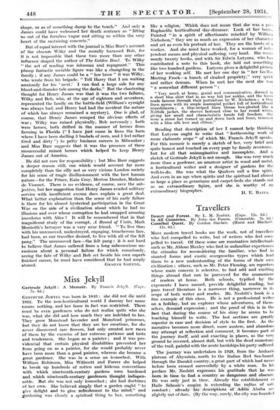Miss Jekyll
Gertrude Jekyll : A Memoir. By Francis Jekyll. (Cape. .7s. 6c1.) GERTRUDE JEKYLL was born in 1843 ; she did not die until 1982. To the non-horticultural world I daresay her name means nothing, and her fame in fact was restricted. There must be even gardeners who do not realize quite who she was, what she did and how much they are indebted to her. They grow Munstead lavender and Munstead primroses, but they do not know that they are her creations, for she never discovered rare flowers, but only created new races of them by the exercise of her extreme patience and taste and tenderness. She began as a painter ; and it was pro- vidential that certain physical disabilities prevented her from going on as a painter, for she would probably never have been more than a good painter, whereas she became a great gardener. She was in a sense an iconoclast. With William Robinson, Miss Willmott and Farrer she helped to break up hundreds of rotten and hideous conventions with which nineteenth-century gardens were burdened and. _which nineteenth-century gardeners thought indispen- sable. But she was not only iconoclast ; she had doctrines of her own. She believed simply that a garden ought " to give delight and to give refreshment to the mind," and gardening was clearly a spiritual thing to her, something like a religion. Which does not mean that she was a pre- Raphaelite hOrticultural day-dreamer. Look at her boot,.
Painted " in a spirit of affectionate mischief by William Nicholson," they are as much an expression of her character and art as even his portrait of her. They are the boots of a worker. And she must have worked, for a woman of inde- pendent means and physical suffering, very hard. She wrote nearly twenty books, and with Sir Edwin Lutyens, who has contributed a note- to this book, she laid out something like two hundred gardens. Lutyens gives a delightful picture
of her working self. He met her one day in " her Go-To. Meeting Frock—a bunch of cloaked propriety," very quiet and rather demure. NVhen he met her the next she was " a somewhat different person " :
" Very much at home, genial and communicative, dressed in a short blue skirt that in no way hid her ankles, and the boots made famous through their portraiture by W. Nicholson ; a blue linen apron with its ample marsupial pocket full of horticultural impedimenta ; a blue-striped linen blouse box-pleated like a Norfolk jacket, the sleeves fastened close to her round wrists, giving her small and characteristic hands full freedom. She wore a straw hat turned up and clown back and front, trimmed with a blue silk bow and ribbon."
Reading that description of her I cannot help thinking that Lutyens ought to write that " forthcoming work of more elaborate scope " of which Mr. Francis Jekyll speaks. For this memoir is merely a sketch of her, very brief and quite honest and touched on every page by family reverence,
but for all that unimaginative and incomplete. And a sketch of Gertrude Jekyll is not enough. She was very much more than a gardener, an amateur artist in wood and metal, a horticultural writer and a designer of gardens for the well-to-do. She was what the Quakers call a fine spirit. And even in an age when spirits and the spiritual had almost
as large a place as geraniums and carpet-beds she stands out as an extraordinary fin-re, and she is worthy of an
extraordinary biographer. H. E. BATES,


















































 Previous page
Previous page